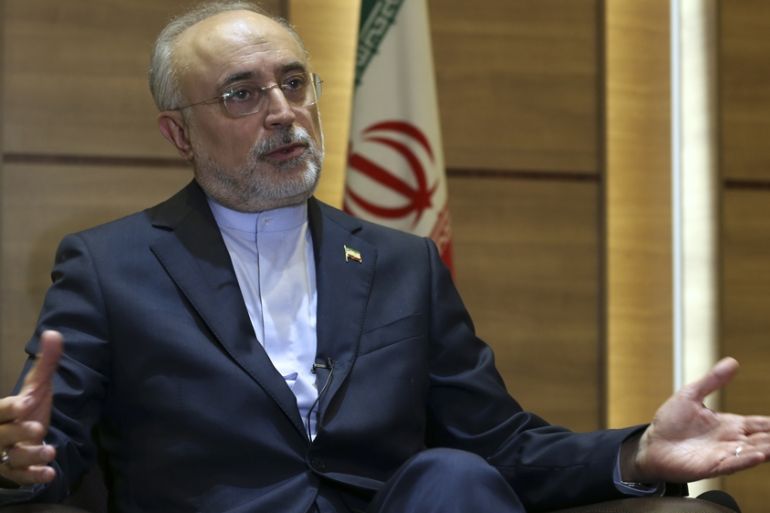Nuclear chief: Iran advances technology to produce nuclear fuel
Ali Akbar Salehi says Iranian scientists ‘on the threshold’ of modernising production of 20 percent uranium.

The head of Iran’s nuclear programme Ali Akbar Salehi has announced that the Islamic Republic has broken new ground on nuclear technology, with scientists taking the first steps to modernise the production of 20-percent nuclear fuel, a move Iranian observers say is a warning to the United States and Europe.
In an interview with the state news agency, IRIB, Salehi said on Sunday that Iranian scientists are “on the threshold” of modernising the mechanism to produce 20 percent uranium fuel.
“This is distinct from the previous 20 percent fuel produced, and we can provide fuel to any reactor similar to the Tehran reactor,” Salehi said.
“Right now, designing a reactor has become very possible for our scientists,” he said without elaborating on the purpose of such development.
Under the 2015 nuclear deal, which Iran and world powers signed, Tehran significantly scaled back its nuclear enrichment and gave up its pursuit of nuclear weapons. Its enrichment of uranium for civilian purposes was also restricted at 3.5 percent, and limited only to 300kg of uranium. Tehran has always denied seeking nuclear weapons.
In exchange, international sanctions against the country were lifted, allowing it to sell oil and gas to the world market.
According to the latest report by UN nuclear inspectors, Iran continues to abide by the regulations of the deal.
But Iran has come under intense economic and political pressure after US President Donald Trump abandoned the agreement in May 2018.
Trump also decided to reimpose US sanctions in August and November, effectively cutting Iran’s vital link to the international trade.
More serious action coming?
Mohammad Hashemi, a Tehran-based journalist and political observer, said Salehi’s statement on Sunday hints that Iran is preparing to take more serious action, while leaving the possibility that it could abandon the deal, also known as the Joint Comprehensive Plan of Action (JCPOA).
“Since the conclusion of 2015 accord, Iranian officials have always reiterated that Tehran can restore all aspects of its nuclear programme that it has agreed to limit under the deal in a short period, if the agreement is violated,” Hashemi told Al Jazeera.
![In recent days, Pompeo has vowed to confront Iran's activities in the region [File: Andrew Caballero-Reynolds/Reuters]](/wp-content/uploads/2019/01/46817d68e3d54346b2199a6bce6bad74_18.jpeg)
Now that Trump has pulled out of the deal, and Europe is hesitating to “stand up against Trump”, Tehran is making good on its threat, he said.
“Otherwise, by failing to do so they have to provide the [Iranian] public with appropriate reasons and explanations why they have failed to fulfil their promises” when they signed the deal.
In recent days, the US government has ramped up its campaign against Iran. In a speech in Cairo on Thursday, US Secretary of State Mike Pompeo vowed to confront Iran in the region.
Tehran had hoped to enjoy economic windfall from the deal, and revive its long-ailing economy. Since the US withdrawal and the reimposition of sanctions, however, Iran’s currency has lost significant value and the country is facing inflation and high unemployment.
|
|
Siavash Fallahpour, a foreign policy reporter based in Tehran, noted that for now, the action announced by Salehi is “just a warning”.
“Iran doesn’t want to withdraw from the deal,” and there is no evidence of such move for now, Fallahpour told Al Jazeera.
He said it is more of a message to European countries, “because they didn’t do anything reliable” for the Rouhani administration, which is “under pressure” by the opposition in the country.
On social media, Mohammad Ali Shabahi pointed to Al Jazeera that the development of 20-percent modern nuclear fuel is different from the 20-percent enrichment of uranium, which is prohibited by the nuclear deal.
Iran has said that it will continue to stay in the deal, as long as it will reap some financial benefits.
But in the past, Salehi was also repeatedly quoted as saying that Tehran only needs a short period to ramp up its uranium enrichment if the nuclear deal collapses.
“If we make the determination, we are able to resume 20 percent enrichment in five days,” he said in August 2017.
In June 2018, Salehi also announced that Iran began work to build advanced centrifuges at its Natanz facility. He also told Iran’s state TV a month later that the effort to acquire uranium has resulted in a stockpile of as much as 950 tonnes.